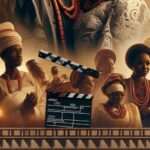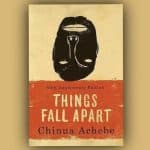African literature finds its roots in our culture and tradition as a people and a continent as a whole. When I think of African literature, I get this nostalgic feeling that takes me back to my roots, my people and my community.
These stories are a source of inspiration to us as a people, our history and our various indigenous cultures. Nobody can tell our stories better than us. These stories remind us of who we are and are histories to generations to come.
Today, I’ll review some notable African literature, pointing out the key differences between them and some Western stories. Stay with me.
Table of Contents
What is African Literature All About?
African literature involves the telling of indigenous stories that have been passed down from one generation to another. Pre-colonial African literature involves folklore, moonlight tales told, and stories teaching morals and standards that guide African society.
Furthermore, African literature helps to tell our indigenous stories to the outside world and gives them an in-depth insight into our cultures and traditions. It clears misconceptions about the beliefs and traditions of the African people. Modern African literature has, however, grown tremendously.
5 Outstanding Examples of African Literature and Their Reviews
-
“Things Fall Apart” by Chinua Achebe
One of Africa’s prolific writers, Chinua Achebe, tells the indigenous story of the southeastern part of Nigeria in this captivating book. African literature cannot be complete without mentioning “Things Fall Apart.”
This book tells the story of Western encroachment into our lands, the issue of change, divergent traditions and the introduction of Western religion. In this story, Okonkwo struggled to grasp the reality of the blooming change that had visited his people.
While Western stories are based on the fact that the Western countries brought us civilization, “Things Fall Apart” tells us how the bond that held us together as a community fell apart as “the centre could no longer hold.” The traditions and culture that held our people together slowly began to fade away.
This book is considered a blend of precolonial African literature and modern African Literature. The book was published in 1958 and has been re-published in more than 100 different languages.
Join our WhatsApp community today. Connect with like-minded people and share your ideas.
-
“Faceless” by Amma Darko
Faceless was written by one of Ghana’s notable and leading writers, Amma Darko. The book tells us that with civilization and change in African society, the nature of our societal problems takes a turn. Faceless tells the story of young children who have been forced to live on the streets without family and proper guidance.
Children whose only request is to be loved and cared for. They learn all forms of societal ills and bad habits to help them survive the harshness of the streets. In this book, there is a realization of the true nature of the streets and what it means for the child.
Fofo, the main character in the book, somehow still believes that the government could help their plight. We see the reality of bad governance play out in the story as nobody cares about the children on the streets. Faceless was published in 1996.
-
“Half of a Yellow Sun” by Chimamanda Adichie
In this book, Chimamanda gives a perfect blend of Precolonial African literature and modern literature in this story. The book is set in the time of the Nigerian civil war and it emphasizes the struggles and challenges faced by persons affected by the war. The story centres on the aftermath of the war, families separated and lost loved ones.
It tells us the state of the country in that post-colonial era where Nigeria was still trying to find herself and recover from the war. It also narrates the involvement of the pre-colonial masters and the roles the developed countries played in the war. The story centres on 4 people, whom we see how love, tribalism, cultural differences and the civil war affected their lives.
Half of a Yellow Sun is a timeless piece of African literature where Chimamanda captures nationalism, struggles and the Post-colonial experiences of Nigeria. The book was published in 2006 and won the Women’s Prize for fiction in 2007.
-
“Petals of Blood” by Ngugi wa Thiong’o
This piece of African literature centres on the post-independence era of Kenya where we see the struggle for freedom and justice. After gaining independence, the country is plagued with corruption and the dangerous consequences of capitalism. The newly independent government comes into power and corruption takes the lead.
The post-colonial theme in the story draws recourse to the rippling effects colonialism had on us as a continent. The struggle of our people to find ourselves again. The story centres on four characters whose lives were intertwined due to the Mau Mau rebellion. The book was published in 1977.
-
“Nervous Conditions” by Tsitsi Dangarembga
This is a non-fiction book that addresses the challenges faced by women in our society, their struggles and what they have to do to succeed in a patriarchal society. The female characters faced a series of oppression based on their gender. The book gives a hybrid mixture of patriarchy and modern African literature.
It is arguably the first African book on feminism written by a black woman. We also see points of colonialism and racism in the storyline, where African students were not treated equally as white students in the school.
This piece of African literature is one of the famous books that explain the struggles of the African woman using its main character Tambu. The book was published in 1988.
African Literature vs Western Stories: Analysing the Discrepancies
African literature is an indigenous literary sphere that has witnessed several peculiar stories told in different languages and diverse forms. The narrative of African literature is quite different from that of Western stories. Western stories are not tied to any particular culture or tradition.
Modern African literature has embedded our long history of values, traditions, customs, proverbs, and words of wisdom from our ancestors. The oral tradition of storytelling, folktales, and the clash between our culture and westernization.
The major distinction between African Literature and Western stories is that; African literature teaches and reminds us of our values, beliefs and our pride as Africans, as people of culture. Western stories are hinged on Western perspectives not particular to any country.
The idea of telling Western stories depends on the particular author to choose his line of storytelling. In African literature, we already have a way of telling our stories, passed down to us.
Subscribe to our newsletter. Don’t miss out on our latest insights about Africa.
Conclusion
African literature involves storytelling that has helped shape our beliefs and culture. Western stories have tried to inculcate the African storyline but in reality, nobody can tell our stories better than we do. These stories take us on a literary journey through our culture and heritage as opposed to Western narratives.
Moreover, African literature encompasses all forms of literary work including pre-colonial African literature and modern African literature. As a result, we have numerous outstanding literary works with roots and credits traceable to Africa.
Related Posts
- How Trees Planting Can Save and Help Africa’s Economy
- Masquerade Festivals in Nigeria’s (or Africa’s) History and the Western World
- 10 Wildlife Conservation Destinations in Africa You Should Visit
Edited by Priscilla Ajayi.
About Author
- Chovwe is content writer and a Fashion Designer. She's also a Chartered Mediator and Conciliator. She's an advocate for peace and loves art. She owns a fashion brand and is very passionate about what she does.
Latest entries





